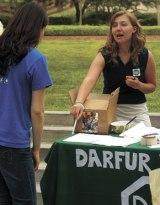US Students draw attention to Darfur crisis
By Adrienne Lynett, THE DAILY BRUIN
April 8, 2005 — To mark the 11th anniversary of the Rwandan genocide, some students are drawing attention to another African crisis – the systematic killing of Sudanese people in the country’s Darfur region.

|
|
Fourth-year anthropology student Bridget Smith informs passersby about the UCLA Darfur Action Committee’s efforts to end the crisis in Sudan. (DB). |
With the horrors of Rwanda in mind, members of UCLA’s Darfur Action Committee participated on Thursday in STANDFast, an event sponsored by mtvU and the nationwide student organization STAND – Students Take Action Now in Darfur.
STANDFast participants pledged to give up one luxury item – ranging from coffee to complaining – and to donate money to the cause of ending the violence in Sudan.
The committee plans to give all funds raised to the Genocide Intervention Fund, which directs donations to the African Union peacekeeping effort.
The day of remembrance included a discussion in Ackerman Viewpoint Lounge with Ruth Messinger, president of the American Jewish World Service, who recently returned from a mission to Sudan.
The discussion was at once a call to action, an information session and a forum for concerned students to voice their opinions about the crisis.
In an even tone, and with an occasional apology for the disturbing nature of her stories, Messinger related her experience assisting refugees in the Darfur region, providing photographs of malnourished children as a visual aid.
She described the plight of one such child, a one-month-old girl whose mother Messinger helped carry across the border to safety.
She watched as another child clung desperately to an aid worker after his parents had been shot and killed in front of him.
The victims of violence who were not too traumatized or fearful for their lives to speak to Messinger described how their attackers rode into the villages shouting ethnic slurs, and raped and murdered the people and destroyed their homes.
These and countless other stories are the result of ongoing violence that has been escalating since early 2003, when the Sudanese government mobilized its militias against rebel groups. Since then, millions have fled their homes and more than 180,000 people have died in what the United Nations has called the world’s worst humanitarian crisis today.
Messinger reminded her listeners that even those who reach the refugee camps are still vulnerable – if not to violence, then often to disease, malnutrition and inadequate shelter, in addition to untold psychological trauma.
“What is going on in Sudan is a genocide,” Messinger said. Though President Bush has called the crisis a genocide, the United Nations has not. But this difference of opinion is merely a matter of semantics, Messinger said.
“It doesn’t really matter what you call it; it matters that you understand what’s happening,” she said.
Messinger compared the crisis in Sudan to the Rwandan genocide of 11 years ago, but said that unlike in Rwanda, the Darfurian conflict has unfolded slowly enough that the international community has no excuse for its lack of action.
“The world is not doing enough,” she said.
Robert Nueagaye, a doctoral student in psychology from South Africa who attended the discussion, voiced his frustration.
“When will the world say ‘never again’ and mean it?” he asked.
The theme of “never again” was a recurring one among attendees of the discussion, as many compared the crisis in Sudan to the Jewish Holocaust, against which the international community did take action.
Because the international community appears to have turned a blind eye to the crisis, Messinger said, it’s up to committed activists, such as the students who participated in STANDFast, to make a difference.
Andy Green, president of the UCLA Jewish Students Association and a member of the Darfur Action Committee, was one such student eager to take on the obligation.
“We have the power and responsibility to address this,” Green said.
STANDFast participants gathered on Thursday evening at the Cooperage for a “Break the Fast” celebration that featured performances by the band Grizzly Peak and the a capella group Random Voices, after which they were once again able to indulge in whatever item they had given up for the day.
